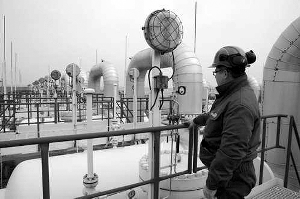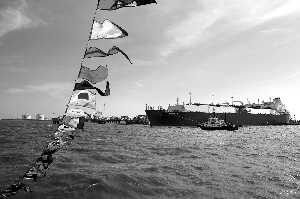
Russia's natural gas reserves account for 27% of the world's natural gas reserves and it is the world's largest natural gas exporter. The picture shows Russia's natural gas pipeline to the European Union. (For CFP)
Sinochem New Network News On the 15th of last month, the Forum of Exporting Countries, the world's largest natural gas producer, met in Doha, Qatar. Fifteen of the 16 producing countries participated in the meeting. Qatar Amir (heads of state) Hamad, Algeria President Abdul Aziz Bouteflika, National Transitional Council of Libya **Jalil and other national leaders and relevant departments of Russia, Iran and other member countries The person in charge attends. At the meeting, member states discussed the possibility of establishing natural gas OPEC. The Doha ** released after the meeting stated that all member states will use active measures to adjust the current price of natural gas in the light of the prices of petroleum and petrochemical products, so as to protect the interests of all member states. This movement has made the media in various countries exclaimed. Has the natural gas OPEC begun to sprout?
If so, how should China respond?
Gas-producing countries have been pursuing price linkages. Because there are precedents for major oil-producing countries in the world to ensure their own interests through OPEC, the desire of the world's major gas-producing countries to seek ties together began as early as 10 years ago.
It is understood that in June 2001, Russia, Iran, and Qatar, which were the top three countries in the world in terms of natural gas reserves, initiated the establishment of a forum for natural gas exporting countries. There have been 12 formal member states so far, and there are also four forums in Norway and Kazakhstan. Observer country. When the Natural Gas Exporting Countries Forum was established, Iran had proposed to establish natural gas OPEC to strengthen the coordination of exporting countries, but it was strongly opposed by the international community. In 2007, Iran’s Supreme Leader Ayatollah Khamenei formally proposed the idea of ​​Iran’s cooperation with Russia and other countries on the basis of a forum for natural gas exporting countries to establish natural gas OPEC, and obtained Russia, Algeria, Venezuela and other major natural gas export countries responded positively. From then on, in 2008 and 2009, the Forum of Natural Gas Exporting Countries rapidly transformed itself into an official international organization. At the 7th Ministerial Meeting held in Moscow on December 23, 2008, the Natural Gas Exporting Countries Forum passed a charter of the organization, which stipulated the establishment of a permanent executive committee and secretariat, and decided to set up its headquarters in Doha.
Although members of major natural gas exporting countries, such as Russia, Qatar and Algeria, have denied that the natural gas exporting countries forum is a natural gas version of OPEC, they also denied that they will jointly control natural gas prices. However, given the status of these countries in the world’s natural gas production, major consumer countries There is growing concern that natural gas exporting countries forums may become natural gas OPEC.
Last month’s high-level member states’ meetings more clearly demonstrated the OPEC trend.
Judging from the amount of resources owned, the control of natural gas resources by member countries of the Natural Gas Exporting Countries Forum is not inferior to OPEC’s control of oil resources. According to statistics, at present, the natural gas reserves of the Forum member countries account for 73% of the world's total. Among them, the natural gas reserves of Russia, Iran, and Qatar account for 27%, 15%, and 14% of the global natural gas reserves, respectively, while global natural gas consumption. 70% of the total amount comes from member countries of the forum. With the proportion of natural gas in energy consumption increasing year by year, the world's natural gas consumption has accounted for about 24% of primary energy consumption in 2010. Since last year, after the nuclear leakage in Japan, countries’ reflections on the use of nuclear energy and various countries’ efforts to implement energy-saving and emission-reduction measures have made this relatively clean and efficient energy source attractive.

Since the Central Asia Natural Gas Pipeline officially began gas transmission from the West-East Gas Pipeline to the Second Line in December 2009, up to now, Xinjiang's Khorgos Port has reached 10 billion cubic meters of natural gas. The picture shows the staff of the Horgos Inspection and Quarantine Bureau conducting inspections and sampling work at the Horgos Metrological Station of the Kazakhstan-China Natural Gas Pipeline. (photo by Shen Hong)
Natural gas world market is temporarily difficult to form Although the forum of natural gas exporting countries has not given up to form an effort to adjust the price of natural gas as oil prices change, there have been many voices doubting the operability of this practice from the very beginning. The skeptics believe that the supply of natural gas is largely achieved through pipelines and long-term contracts, and it is difficult to coordinate. Unlike oil, there is a unified and flexible global market.
Xia Yishan, a researcher at the China Institute of International Studies, has been watching the development of this organization for many years. In his view, if it is compared with the calorific value formed by the burning of petroleum and coal, the current price of natural gas is indeed low. Now, it is understandable that natural gas exporters want to increase gas prices and increase profits with changes in oil prices. However, there is a fatal flaw in the natural gas market, which is that natural gas differs from oil in that it has a unified global market. Therefore, it is difficult to increase natural gas prices with changes in oil prices. At least from the current point of view, the natural gas market can only rely on the supply and demand sides of natural gas to negotiate and negotiate prices. “Since it is negotiations and agreements that form long-term contracts and prices, it requires real coordination and cooperation between the two sides. Under the premise that there are many natural gas supply channels, unilaterally raising and adjusting natural gas prices may not accept the other party. Cooperation does not exist. It also talks about raising prices and increasing profits," said Xia Yishan.
Because of this, despite the rapid development of liquefied natural gas in recent years, the world's largest market has still not formed. The contract structure and price formation mechanism of LNG are not the same in all regions. It is still a point-to-point supply contract, and there is no long-term price. LNG trading in the contract only accounts for 1/5 of the liquefied natural gas market.
Another expert said that for the sponsors of the three natural gas export countries of Russia, Iran and Qatar, although they are constantly making efforts to increase the right to speak and control of natural gas prices in the natural gas market, they are not in the same direction.
Russia is a big producer and exporter of natural gas. Natural gas is sold through pipelines to other countries. Although Iran has 15% of the world's reserves, it has repeatedly discovered gas fields in recent years. However, it is subject to severe Western sanctions and other international political factors. Resources have not been fully exploited for a long time, and they have no intention of importing natural gas from countries such as Turkmenistan. Qatar has the third-largest natural gas reserves in the world, second only to Russia and Iran. Although Qatar's natural gas quality is excellent, it is limited to exploitation, storage and transportation capacity and technical limitations. It was not until 1997 that the export of the first ship of LNG to Japan began to harvest the wealth of natural gas resources. At present, natural gas in Qatar is mainly delivered to the rest of the world as liquefied natural gas. Obviously, the “three troikas†have different directions of exertion, and it is difficult to form a synergy. It is still difficult to form a consensus on natural gas production capacity and prices.
China's famous oil energy security expert Cha Daojun believes that the most important reason for the obstruction of natural gas OPEC so far is that exporting countries are facing the choice of natural gas transmission methods. After natural gas is extracted, it is either piped directly to end-users (power plants, chemical plants, residential houses, etc.) or it is liquefied. LNG is natural gas cooled at -162°C. Reliable technology has been developed to effectively store and transport natural gas (including pipeline transportation). Liquefied natural gas needs to be canned, regasified, and finally entered into the user gas delivery network. For natural gas exports, the construction of the downstream pipeline network is one of the necessary conditions. The construction of the importer’s pipeline depends on the source of supply—the degree of stability in the supply and sales price levels. Obviously, the change in the production and trade volume of natural gas is far from flexible in oil.
China should take precautions to rely on self-development Although it seems unlikely to many people in the industry that the establishment of a natural gas OPEC is unlikely, the Doha Conference at the end of the globe still affects China's attention.
Cha Dao said that although it is difficult to establish natural gas OPEC in a short time, this does not mean that the possibility of the establishment of natural gas OPEC will disappear. The Organization of Petroleum Exporting Countries was formally established and is also based on an export country forum for more than 10 years. If the government of the consuming countries encourages and finances the pace of building natural gas consumption capacity, then it is easy to form a situation where the importing countries compete for the same source of gas. The policy space for the exporting countries to raise their asking prices will be greatly increased.
Industry insiders believe that if natural gas OPEC is established, it will mean a tougher rival for China, an increasingly foreign country relying on energy. Therefore, we must maintain active and continuous contact with the major importing countries so that we can take precautions. As an importer, China's efforts to negotiate with exporters on the basis of coordinating with other importers is an arrangement with a higher insurance factor.
Cha Daojun said that for the changes in the international energy and trade forms including natural gas OPEC, China needs to grasp the two aspects of domestic policy measures and participation in the formation of foreign trade environment, instead of staying at the observation level. , mistakenly thought that "there is food in hand (the purchasing power, the potential for market consumption) in the mind is not panic (instead of the supply side does not consider China's influence)". On the issue of natural gas imports, we have not had the cost to repeat the mistakes of recent years: The domestic high-energy-consuming industries have grown substantially, the demand for offshore oil has risen, and we have also discussed substantially how to increase China's voice in the international market.
Han Xiaoping, chief energy officer and energy expert at China Energy Network, said that if natural gas exporters are determined to establish natural gas OPEC, for China, it is necessary to continuously adjust strategic deployments, especially capital. If they scrambled prices too high, or if the price becomes uncontrollable, we may have to invest more capital in our natural gas exploration and development. We must also rely more on our own resources. In this respect, if we invest more money, we can also ensure our own gas supply through our own resources.

The first imported natural gas from the Jiangsu Port was successfully unloaded at the LNG receiving terminal at the East Port of Yeokou on June 1. The annual gas supply capacity of Yangkou Port liquefied natural gas receiving station is about 3.5 million tons. (Photo by Julian)
Ultrasonic Flowmeter,Portable Flow Meter,Portable Ultrasonic Flow Meter,Ultrasonic Water Flow Meter
Wuxi Winsun Automation Instrument Co., Ltd , https://www.winsunwx.com